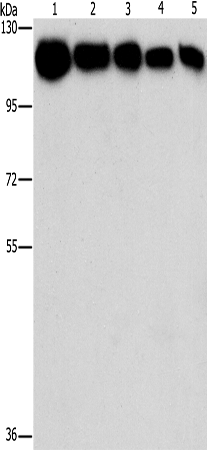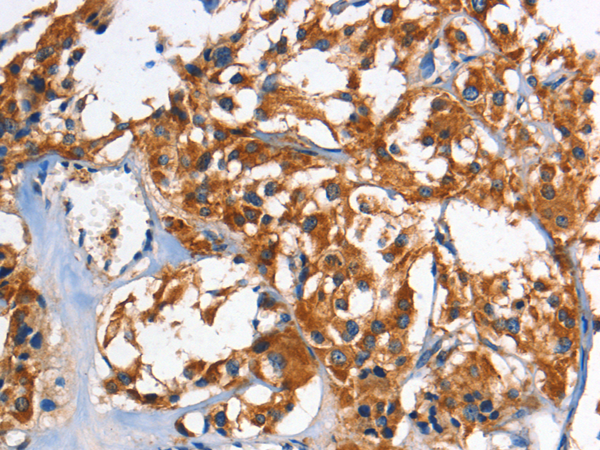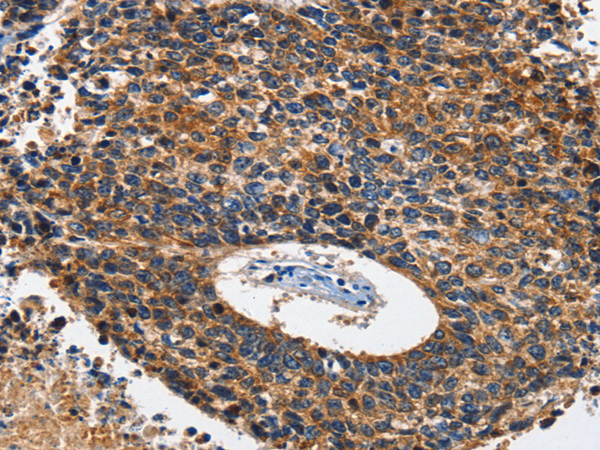


| WB | 咨询技术 | Human,Mouse,Rat |
| IF | 咨询技术 | Human,Mouse,Rat |
| IHC | 1/100-1/300 | Human,Mouse,Rat |
| ICC | 技术咨询 | Human,Mouse,Rat |
| FCM | 咨询技术 | Human,Mouse,Rat |
| Elisa | 1/2000-1/10000 | Human,Mouse,Rat |
| Aliases | HK; HKD; HKI; HXK1; RP79; HMSNR; HK1-ta; HK1-tb; HK1-tc; hexokinase; HKII; HXK2 |
| WB Predicted band size | 102 kDa |
| Host/Isotype | Rabbit IgG |
| Antibody Type | Primary antibody |
| Storage | Store at 4°C short term. Aliquot and store at -20°C long term. Avoid freeze/thaw cycles. |
| Species Reactivity | Human, Mouse, Rat |
| Immunogen | Fusion protein of human HK1/HK2 |
| Formulation | Purified antibody in PBS with 0.05% sodium azide and 50% glycerol. |
+ +
以下是关于HK1/HK2抗体的3篇参考文献的简要信息:
---
1. **文献名称**: "Hexokinase 2 is a key mediator of aerobic glycolysis and promotes tumor growth in human glioblastoma multiforme"
**作者**: Wolf A. et al.
**摘要**: 研究通过免疫组化(使用HK2特异性抗体)分析胶质母细胞瘤中HK2的表达,发现HK2高表达与肿瘤细胞依赖有氧糖酵解相关,敲低HK2显著抑制肿瘤生长。
---
2. **文献名称**: "Differential roles of HK1 and HK2 in synaptic activity-induced metabolic stress in Alzheimer's disease models"
**作者**: Chen Y. et al.
**摘要**: 利用HK1抗体检测阿尔茨海默病小鼠模型脑组织,发现HK1在线粒体功能中起保护作用,而HK2(通过Western blot验证)在病理状态下表达上调,可能与神经元代谢紊乱相关。
---
3. **文献名称**: "Targeting hexokinase 2 enhances response to radio-chemotherapy in triple-negative breast cancer"
**作者**: Li X. et al.
**摘要**: 通过免疫荧光(使用HK2抗体)和流式细胞术,研究发现HK2在三阴性乳腺癌中高表达,抑制HK2可增强肿瘤对放化疗的敏感性,提示其作为治疗靶点的潜力。
---
4. **文献名称**: "Tissue-specific distribution of HK1 and HK2 isoforms impacts systemic glucose homeostasis"
**作者**: Roberts D.J. et al.
**摘要**: 采用HK1和HK2特异性抗体分析小鼠不同组织中的表达模式,发现HK1在脑和肌肉中占主导,而HK2在脂肪和肝脏中富集,两者分布差异影响全身糖代谢调控。
---
以上文献均涉及HK1/HK2抗体在疾病模型或生理机制研究中的应用,涵盖肿瘤、神经退行性疾病及代谢调控方向。
HK1 and HK2 antibodies target hexokinase-1 (HK1) and hexokinase-2 (HK2), key isoforms of the hexokinase enzyme family involved in glycolysis. Hexokinases catalyze the first step of glucose metabolism, phosphorylating glucose to glucose-6-phosphate, which is critical for energy production and biosynthetic pathways. HK1 is ubiquitously expressed, particularly in tissues with high energy demands (e.g., brain, muscle), and is tightly bound to mitochondrial outer membranes via interactions with voltage-dependent anion channels (VDAC). This localization optimizes ATP production by coupling glycolysis to mitochondrial oxidative phosphorylation. In contrast, HK2 exhibits a more restricted expression profile, primarily in insulin-sensitive tissues (e.g., adipose, skeletal muscle) and certain cancers. HK2 is frequently overexpressed in tumors, where it supports the Warburg effect—a metabolic shift favoring aerobic glycolysis for rapid energy and biomass production, even under oxygen-rich conditions.
HK1/HK2 antibodies are essential tools for studying metabolic regulation, cancer biology, and therapeutic targeting. HK2-specific antibodies are particularly valuable in cancer research, as HK2 upregulation correlates with tumor progression, metastasis, and drug resistance. These antibodies enable detection of isoform-specific expression patterns in tissues or cell lines, aiding in biomarker discovery and mechanistic studies. Additionally, HK2 inhibition using antibodies or small molecules has shown preclinical promise in disrupting cancer cell metabolism. HK1 antibodies, meanwhile, help explore its roles in normal physiology and neurodegenerative diseases. Both antibodies are crucial for understanding isoform-specific functions and developing targeted therapies for metabolic disorders and cancer.
×